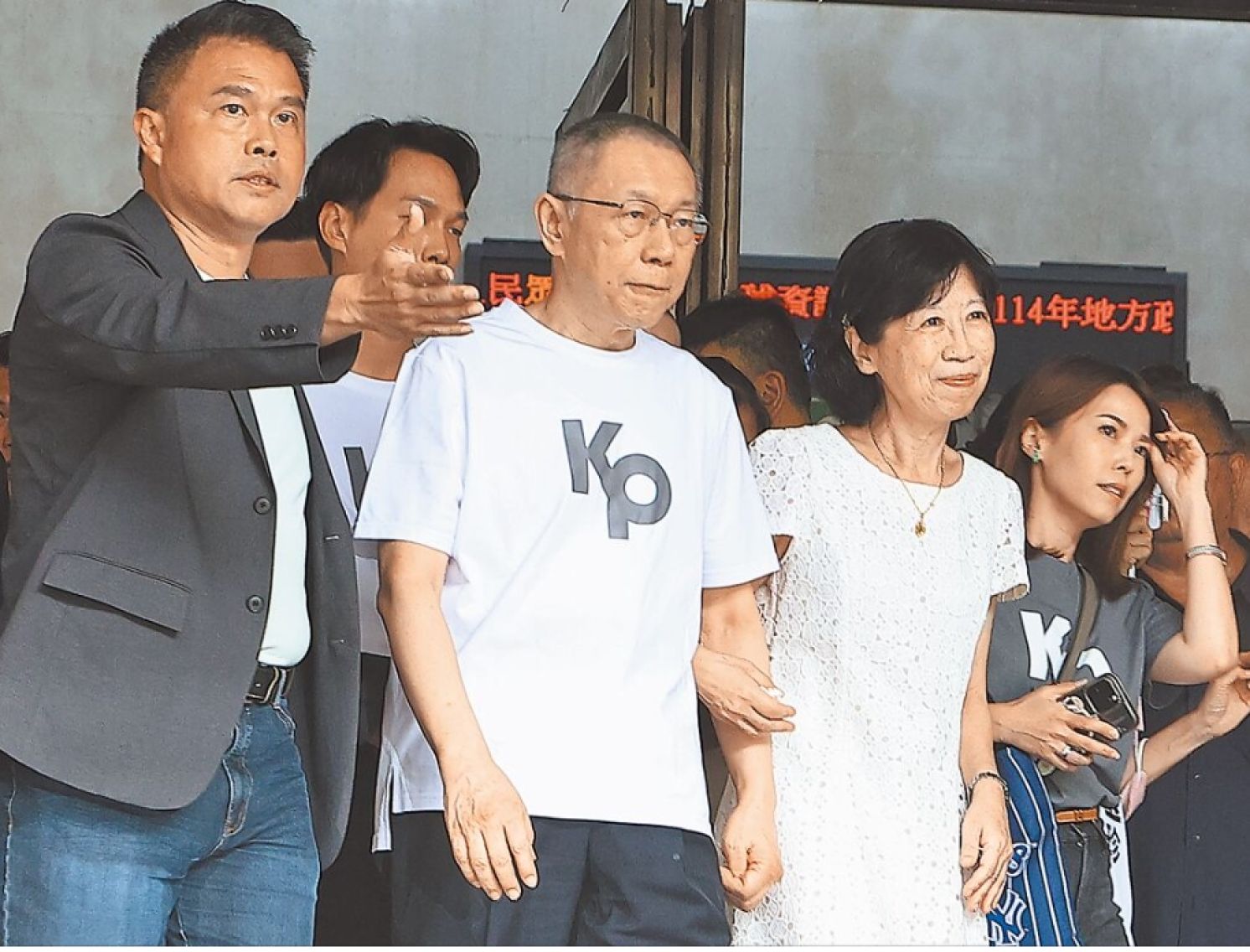
Ko Aims Fury at President Lai
United Daily News Commentary, September 9, 2025
After enduring a year of dark, endless detention, Ko Wen-je, former Taipei mayor and former chairman of the Taiwan People’s Party (TPP), finally “saw the light of day” on September 8, leaving his cell with an electronic ankle monitor as he walked out of the Taipei District Court. Supporters erupted in thunderous cheers, accompanied by louder shouts condemning judicial injustice. The ruling camp calculated that Mr. Ko’s release on bail was the perfect opportunity to fracture cooperation between the Kuomintang (KMT) and TPP, but the outcome may not be as favorable to the ruling Democratic Progressive Party (DPP) as imagined.
Upon his release, Mr. Ko immediately struck a hardline posture, lashing out at both the Taipei District Prosecutors Office and President Lai. He branded the Living Mall case a wrongful imprisonment, questioning why prosecutors, after a year of investigation, found nothing: “The DPP never dreamed the TPP would be this clean.” He further blasted President Lai for dividing the nation, urging him to reflect. Before leaving in his car, Mr. Ko loudly told his supporters: “I will never surrender! I will never yield!”—signaling that a transformed “Ko Wen-je 2.0” is ready to launch a fierce counterattack against the judiciary and those in power.
Mr. Ko’s detention over the past year was not only a legal matter but also a political storm. During his imprisonment, his father passed away, his mother fell ill from grief, and his wife suffered from anxiety and depression. Despite a year of investigation, prosecutors produced no solid evidence in the Living Mall case. Many voters who had initially withheld judgment began questioning whether the judiciary was engaging in selective prosecution, eroding trust in both the ruling party and the justice system. This label of “political victim” did not drain Mr. Ko’s political strength; instead, it revitalized him during his forced silence.
Some within the DPP had hoped that Mr. Ko would emerge as a “tamed bird in a cage,” perhaps even willing to accept conditional arrangements in exchange for keeping the TPP at a distance or cooperating strategically in future elections. Such wishful thinking ignores one reality: Mr. Ko is one of the few Taiwanese politicians skilled at stirring waves and mobilizing public sentiment. Having long branded himself as “anti-authoritarian” and “anti-backroom deals,” and now carrying the role of a “victim of political persecution,” how could he willingly reduce himself to a pawn in the DPP’s political game?
On the KMT side, concerns loom large. The KMT and TPP had signed a six-point cooperation agreement before the 2024 presidential election, but it collapsed due to lack of trust and tactical divisions. Many in the KMT were furious at Mr. Ko’s perceived inconsistency. Now that Mr. Ko has returned to the political arena, will he once again overturn existing understandings, jeopardizing blue-white cooperation? This is a lingering shadow for the KMT, who fear that if opposition unity breaks down, President Lai could once again ascend to the pinnacle of power. In that scenario, the DPP might reap the benefits of a divided opposition in the 2026 local elections and even the 2028 presidential race.
Yet the situation may not unfold as the DPP anticipates. Indeed, in politics, there are no eternal friends or enemies—only eternal interests. But from an emotional standpoint, Mr. Ko’s year-long detention, coupled with a sweeping “house search and purge” that cast a pall of sorrow over his entire family, has left scars that will not vanish simply because he was released on bail. To Mr. Ko, President Lai and the DPP remain his true “enemies.” While there may still be room for maneuver in the political arena, the emotional rupture is unlikely to heal easily.
From a political standpoint, the Taiwan People’s Party (TPP) has endured a year of immense pressure, with its chairman imprisoned and the entire party subjected to sweeping searches and investigations. Having narrowly survived what some called an existential crisis, the TPP, with support and solidarity from the Kuomintang (KMT), continues to wield influence as a pivotal third force in the legislature. The KMT, for its part, weathered two major recall crises thanks to the TPP and its grassroots supporters who set aside differences to offer crucial assistance—laying the foundation for deeper trust in “blue-white” cooperation. The trust forged in adversity has only strengthened their joint ability to challenge the ruling party.
Thus, to portray Mr. Ko’s release on bail as an “olive branch” from the DPP seems wishful thinking. Emerging from prison with anger and resentment, Mr. Ko’s most likely path is to align with the KMT in confronting the DPP. While his political style has always been unconventional—testing and tugging at the balance between the blue and white camps—his ultimate target is almost certain to remain the DPP.
Mr. Ko’s role as a “victim” has only intensified his supporters’ emotions. Hatred-driven mobilization is a powerful force—one that the DPP itself has long mastered—yet it now risks backfiring as its political purge of dissenters may come to haunt it.
Mr. Ko has returned with the energy of revenge. The case against him is deeply entangled with political overtones, one where believers will continue to believe and skeptics will never be convinced. But in the next three years, Mr. Ko could prove to be the biggest wildcard in Taiwan’s political arena. Having once cooperated with the DPP, Mr. Ko knows the party inside and out. President Lai and the DPP must now prepare to face a more intense and unpredictable political struggle.
From: https://vip.udn.com/vip/story/122365/8992182?from=vipudn_maincate_latest